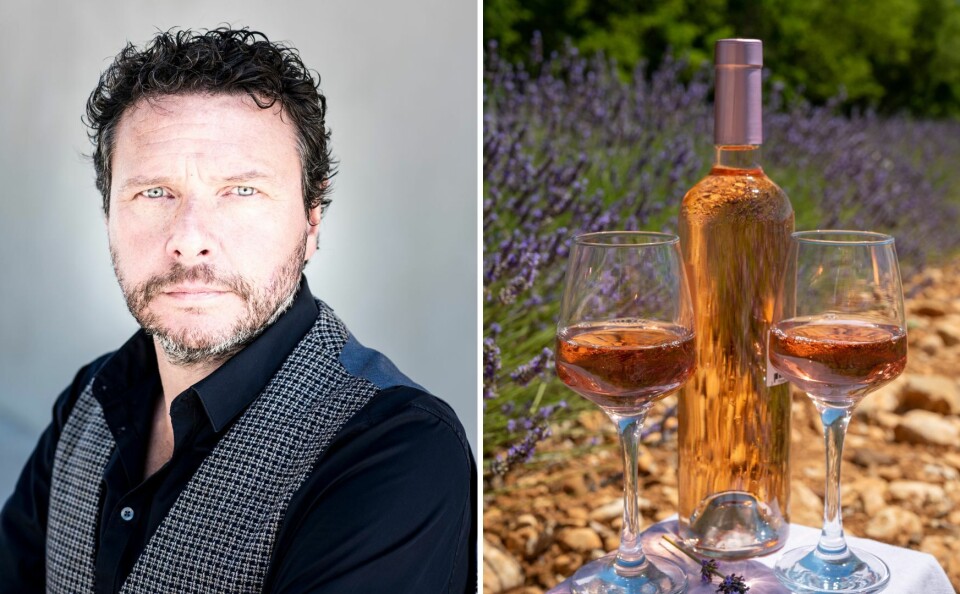-
Costume, music, floats: where to see France’s vibrant carnival parades
Celebrate the end of winter with feasting and fun at a carnival near you
-
February events in France: Art, agriculture, and festivals
Discover the reopening of Bonnat-Helleu Museum, Paris International Agricultural Show, Menton's Citrus Festival, and Matisse exhibition in Bordeaux
-
Can small businesses earn interest on deposits in France?
Accounts in France are dominated by government-regulated products such as the Livret A and its higher-paying counterpart, the Livret d’épargne populaire (LEP)
‘I fight for wine in French culture, heritage and economy’
The new president of France’s most powerful wine lobby talks to The Connexion about climate change, health and the true value of wine

In November 2021, Samuel Montgermont was selected as the new president of Vin & Société, France’s most powerful lobby of the wine industry, after having been its treasurer for seven years.
This promotion followed another in March 2021, when he was named director of the Union des Maisons de Vins du Rhône, the Rhône-Alpes region’s wine union, in a career focused entirely on the wine industry.
Born in Brittany but raised in Rhône-Alpes, where he graduated from law school with a focus on wine industry law, Montgermont describes himself as a man at the head of a company passionately defending one of France’s most culturally important industries.
Read more: What makes the perfect French wine fair?
Vin & Société’s new president spoke to The Connexion about France’s ancestral heritage and its roots, the intangible value of French wine and its economic benefits, but he did not hold back when asked about the decline of wine production and how the industry is adapting to new challenges.
He also shared his thoughts on his preventative role concerning alcohol consumption.
This comes on the back of his company often being attacked by health professionals, and the wine industry being curtailed by the regulations of the loi Evin, a French law prohibiting alcohol advertisements on several platforms.
You made a reference on your website about ‘the worth of wine and vineyards’. What does this mean specifically?
This question requires two answers. When speaking about worth, Vin & Société participates in lowering France’s commercial balance deficit.
Wine exports increase year on year. We have grown our exports and worth in 2021.
Wine represents €35 billion in France’s total export revenues of €200 billion.
There is another, materialistic, value to wine, as France is internationally renowned for its gastronomie.
When people think of France, they picture its gastronomie and the Eiffel Tower.
I have read the immaterial value of the Eiffel Tower was estimated to be around €434 billion for ‘brand France’ so to speak. I hope I can provide an accurate immaterial value to the wine industry, since it is another strong component of our national brand.
For example, how many French diplomats have offered bottles of wine as gifts during official visits for presidents to drink?
Like in 2019 when President Macron and Chinese president Xi Jinping visited the Foire internationale des importations de Chine and they drank wine and ate beef…
We are proud of that, and I think it is a pride felt by France, the wine industry and respected French oenologues [people employed in the study of wine and winemaking] as well.
This craftsmanship is part of an ancestral heritage cultivated by passionate people, myself included.
I was born in Brittany but learned my craft in the wine-law industry in the Rhône-Alpes region.
When you are passionate about something, you tend to surround yourself with passionate people.
I mention it because it’s a characteristic that tends to be forgotten about in the world of wine making.
Wine growers love their culture, their land and terroir and their village. These are very French values, but this is what makes France so charming.
You mentioned an immaterial value for wine. Do you have a number in mind?
No. I have no figures in mind, but think we cannot be too precise.
However, it’s likely that the industry is worth far more than the Eiffel Tower’s €434 billion, considering that far more people visit historically wine-centred territories than climb Paris’ famous landmark.
The wine sector is in a dire situation according to people I have interviewed recently, because of factors such as the pandemic, the war in Ukraine or the deterioration of soils. Do you agree with these terms?
The crisis of the wine industry is contained within a larger crisis in general. The war in Ukraine comes on top of additional hardships.
Global warming is the most worrying issue for our industry.
Read more: Grape harvest begins earlier than ever in south France due to heat
When I started as a lawyer in the business, for example, we would usually scale vineyard losses on a ten-year-long chart.
Nowadays, it has been shortened to three years. We have reduced bud bursts in an effort to adapt and reinvent the sector, but climate change is undeniably hurting the soils immensely.
I have read in a study that the south of the UK is now producing decent wines, due in no small part to global warming. As temperature increases expand vineyard culture geographically, what impact does this have in France?
You can split France between the north and the south.
In the south, global warming is affecting the soil. It is not getting hotter in the south, contrary to popular belief, but producers are witnessing more consecutive days and periods of heat.
This results in changing the wine’s maturity.
It is particularly noticeable in southern France because of great cépages like the Syrah or the Pinot having benefited greatly from the increase in temperature.
The industry adapted as a consequence and now offers a greater variety of wines.
This is less true in northern France as you can probably imagine.
What is the main manifestation of such a cultural and patrimonial enthusiasm?
History. It built who we are today.
Take the example of the Roman legionaries who settled in the Rhône-Alpes region over 2,000 years ago. They created the first wine of the region because the space they were offered opened to sedentary conditions.
This is also the product of foreigners’ viewpoints, who notice an extraordinary diversity in soils, terroirs and cépages in a relatively small country.
The French are the only people who would fight over the differences between two cépages separated from each other by three metres.
Would you then claim as your own Charles de Gaulle’s quote about France being an ungovernable country because of its 400 different sorts of cheese?
(Laughs) I do not think so since there are fewer wine varieties than cheese.
This is also one of the reasons why the industry is hard to regulate. Everybody wants to put their specificity forward, having trouble understanding they are not the only ones around.
I think people in Bordeaux often forget that other wine producers exist outside of Bordeaux. This is how the industry is structured.
Can wine be treated the same way as other types of alcohol?
This is a misleading question. Of course it is, since it contains ethanol.
I will never tell you wine is an alcohol-free beverage, because it is not true.
We are walking a thin line between occasional and abusive consumption. The vast majority of our industry is composed of occasional drinkers. Only 11% of them drink regularly.
Overall wine consumption has sharply decreased since the 1960s. How does that resonate with what you just said?
The industry is reorganising itself. The product’s overall value is increasing with consumers choosing wine with a great and respectable reputation.
Our wine producers have increased their average price in turn. This is part of an overall reorganisation provoked by the coronavirus pandemic.
I have always heard over the course of my career the cliché about producers producing less but better.
This has never been more true than over the last six months. We have decreased by 10% in volume but increased prices by 13%.
We are no longer in the ‘60s where we drink 160 litres per person per year.
Is this arbitration and conscientiousness around drinking a setback to cultural heritage?
Listen, producers have witnessed a decrease in production in several parts of the region for 15 years.
They know they will probably never reach the level they were used to in the past. You never go against a market. Never.
Some cépages have disappeared, others are more highly valued than in the past.
Overall, there is a better balance between red, white and rosé wines.
I was about to pick up that point. What new trends are you witnessing? I have read that women are drinking more sparkling wine and that rosé is getting trendy again.
You know, when I started my career, rosé was not even classified as a wine by Americans.
It was not even palatable. I am not joking when I say that.
It is now the number one market for France thanks to a great rebranding from Provence producers who were able to reinvent themselves.
Read more: Kylie Minogue launches top-of-the-range rosé produced in Var
White wines are drunk for longer spans of time throughout the meal.
Red wine’s consumption is decreasing because it is often associated with red meat and is suffering from more meat-free options in people’s diets.
You are absolutely right when mentioning a boom in sparkling wine, particularly in the UK and the United States.
Do you have an explanation?
Absolutely, and the reason is pretty simple.
We are faced with a generation of consumers infatuated with Coca Cola and fresh drinks.
Taking my children as an example, there’s always room for crémant or champagne in the conversation, but not so much with red wine.
What is your stance on the current regulations around the Evin law?
This is one of the most restrictive laws when it comes to promoting alcoholic beverages.
This is rather strange in a country that prides itself on its cultural heritage and diversity of its wine industry.
The law is designed to avoid excessive consumption, something Vin & Société fights for as well.
The country is not infatuated with such restrictions when promoting a business. We abide by the law and respect it.
Do you think that Vin & Société should be one of the advisors on alcohol consumption?
Who is best suited to talk about the effects of the products than the producers themselves?
This is the main issue we face with health professionals that do not consider us as part of the equation.
Our producers offer training and tasting activities within our industry.
I do consider them to be the most suited to inform people about sensible use of our products. This is what we fight for.
President Emmanuel Macron said he drinks one glass of wine every lunch and dinner. Is he the best ambassador you have?
He drinks like 80% of French people.
Read more: Pro-wine President Macron pleases industry but upsets doctors
It is normal. Our president resembles French people.
Some 90% of French people say that the French have a particular relationship with wine.
In that regard, a president who does not drink would be quite surprising even though we have had one recently. [Nicolas Sarkozy who was known for drinking only Coca-cola.]
If you had to choose just one, which wine should our readers drink?
I am going to go with a wine from Rhône-Alpes, obviously.
British people have close ties with the Rhône-Alpes region, particularly the Châteauneuf-du-Pape.
I think the Grenache is appreciated because it is less astringent than the Cabernet.
One British journalist always told me: “We buy wines from Bordeaux to make a profit. We buy wines from the Rhône-Alpes to drink.”
Related articles
French vineyard offers free wine to noisy campers to keep boars away
‘Tchin tchin’, ‘santé’, eye contact: The rituals of French apéros
























